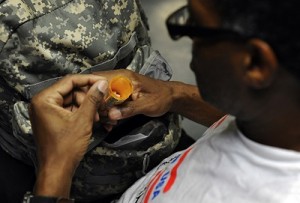Military Connection: Best Advice for PTSD Patients: By Debbie Gregory
 According to military doctors, the best and most effective way to combat Post Traumatic Stress Disorder (PTSD) is to stay in treatment.
According to military doctors, the best and most effective way to combat Post Traumatic Stress Disorder (PTSD) is to stay in treatment.
A survey of 400 Veterans from Iraq and Afghanistan with PTSD revealed that 70% of them stopped seeking care by the eighth session. Many doctors believe that a minimum of 12 treatments are needed before major progress can be made.
Lt. Col Gary Wynn, a doctor and assistant chair at the Department of Psychiatry at the Uniformed Services University of the Health Sciences, believes that staying in treatment can be more important than the type of treatment being administered. Dr. Wynn found that when patients stayed in treatment, the benefits lasted longer than they did in patients who skipped out after only a few sessions. He encourages the inclusion of friends and family members as a means of sticking with the program.
“[Therapy] works better when you do it together with a partner,” Wynn says.
With so many treatment options available, it can be confusing for both doctors and patients to choose the best ones. Treatment types include medication, psychotherapy, as well as less conventional methods.
Currently, there are only two medications approved by the Food and Drug administration for the treatment of PTSD, Paroxetine, also known as Paxil, and Sertraline, also known as Zoloft.
Several forms of psychotherapy used to treat PTSD have shown promising results. These therapies include Acceptance and Commitment, Exposure, Web-based Cognitive Behavioral, Trauma-Focused, Image Rehearsal, Dialectical Behavior, Cognitive, Stress Management, Eye and Movement Desensitization.
With so many types of effective psychotherapy treatments available, it can be difficult in deciding on one. But the best treatment is one that makes the patient feel empowered, or otherwise positive about their sessions. A positive result will encourage the continuation of treatment.
Non-conventional methods of treatment are usually not as thoroughly researched as medications or psychotherapy. While many generate positive results, they are not consistent and not proven. Doctors have prescribed such non-conventional methods as aromatherapy, herbal remedies, relaxation exercises, martial arts training, yoga, and even virtual reality. Many of these treatments are used in conjunction with psychotherapy or medication.
The best option for anyone suffering from PTSD is to seek and stay in treatment. After that, finding the right doctor and treatment is paramount to staying with it.
Military Connection proudly serves those who serve in the Army, Navy, Air Force, Marines, Coast Guard, Guard and Reserve, Veterans and their Families. We are the go to site for Veteran Employment and information on Veteran education. Militaryconnection.com provides Veterans with and Directory of Employers, a Job Board, information on the Post-9/11 GI Bill, and a blog that offers Veterans boundless information. Be sure to visit Militaryconnection.com, the go to site.
Military Connection: Best Advice for PTSD Patients: By Debbie Gregory




















